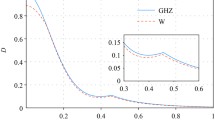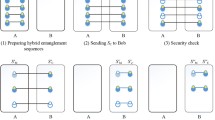Abstract
Multi-party quantum key agreement (MQKA) is a significant technique for generating shared keys among multiple participants in a secure and fair manner but dealing with imperfect quantum measurement devices presents practical challenges. In this paper, we propose a feasible measurement device independent multi-party quantum key agreement (MDI-MQKA) protocol with identity authentication, based on the BB84 polarization states and the GHZ entangled states. In our proposed MDI-MQKA protocol, participation is restricted to authenticated individuals, avoiding the possibility of impersonating participants. Following the execution of MDI-MQKA, each authenticated participant can acquire their respective private keys in a fair manner, with the assistance of the third party. We analyze and prove the correctness, feasibility of authentication, security, and fairness of the proposed MDI-MQKA protocol in detail. The proposed MDI-MQKA protocol represents a promising investigation into MQKA protocols and measurement device independent technologies, which can help advance the practical application of quantum information technology.






Similar content being viewed by others
Data availability
Data sharing is not applicable to this article as no data sets were generated or analyzed during the current study.
References
Nadlinger, D., Drmota, P., Nichol, B., Araneda, G., Main, D., Srinivas, R., Lucas, D., Ballance, C., Ivanov, K., Tan, E.-Z., et al.: Experimental quantum key distribution certified by bell’s theorem. Nature 607(7920), 682–686 (2022)
Wang, S., Yin, Z.-Q., He, D.-Y., Wang, R.-Q., Ye, P., Zhou, Y., Fan-Yuan, G.-J., Wang, F.-X., Chen, W., Chen, W., et al.: Twin-field quantum key distribution over 830-km fibre. Nat. Photon. 16(2), 154–161 (2022)
Zhang, Y., Chen, Z., Pirandola, S., Wang, X., Zhou, C., Chu, B., Zhao, Y., Xu, B., Yu, S., Guo, H.: Long-distance continuous-variable quantum key distribution over 202.81 km of fiber. Phys. Rev. Lett. 125(1), 010502 (2020)
Dutta, A., Pathak, A.: New protocols for quantum key distribution with explicit upper and lower bound on secret-key rate. arXiv:2212.13089 (2022)
Sun, Z., Yu, J., Wang, P.: Efficient multi-party quantum key agreement by cluster states. Quantum Inf. Process. 15, 373–384 (2016)
Yang, Y.-G., Li, B.-R., Kang, S.-Y., Chen, X.-B., Zhou, Y.-H., Shi, W.-M.: New quantum key agreement protocols based on cluster states. Quantum Inf. Process. 18, 1–17 (2019)
Xu, G.-B., Wen, Q.-Y., Gao, F., Qin, S.-J.: Novel multiparty quantum key agreement protocol with ghz states. Quantum Inf. Process. 13, 2587–2594 (2014)
Liu, B., Gao, F., Huang, W., Wen, Q.-Y.: Multiparty quantum key agreement with single particles. Quantum Inf. Process. 12, 1797–1805 (2013)
Wei, C.-Y., Cai, X.-Q., Huang, S.-L., Lang, X.-L., Wang, T.-Y.: Loss-tolerant quantum multi-party key agreement without quantum storage. Opt. Express 30(22), 40569–40583 (2022)
Xu, T.-J., Chen, Y., Geng, M.-J., Ye, T.-Y.: Single-state multi-party semiquantum key agreement protocol based on multi-particle ghz entangled states. Quantum Inf. Process. 21(7), 266 (2022)
Liao, Q., Liu, H., Zhu, L., Guo, Y.: Quantum secret sharing using discretely modulated coherent states. Phys. Rev. A 103(3), 032410 (2021)
Williams, B.P., Lukens, J.M., Peters, N.A., Qi, B., Grice, W.P.: Quantum secret sharing with polarization-entangled photon pairs. Phys. Rev. A 99(6), 062311 (2019)
Gao, Z., Li, T., Li, Z.: Deterministic measurement-device-independent quantum secret sharing. Sci. China Phys. Mech. Astron. 63(12), 120311 (2020)
Yang, Y.-G., Teng, Y.-W., Chai, H.-P., Wen, Q.-Y.: Fault-tolerant quantum secret sharing against collective noise. Phys. Scr. 83(2), 025003 (2011)
Wei, C.-Y., Cai, X.-Q., Wang, T.-Y., Qin, S.-J., Gao, F., Wen, Q.-Y.: Error tolerance bound in qkd-based quantum private query. IEEE J. Sel. Areas Commun. 38(3), 517–527 (2020)
Gao, F., Qin, S., Huang, W., Wen, Q.: Quantum private query: a new kind of practical quantum cryptographic protocol. Sci. China Phys. Mech. Astron. 62, 1–12 (2019)
Wei, C.-Y., Cai, X.-Q., Liu, B., Wang, T.-Y., Gao, F.: A generic construction of quantum-oblivious-key-transfer-based private query with ideal database security and zero failure. IEEE Trans. Comput. 67(1), 2–8 (2017)
Li, X., Zhang, K., Zhang, L., Zhao, X.: A new quantum multiparty simultaneous identity authentication protocol with the classical third-party. Entropy 24(4), 483 (2022)
Qian, Y., Gui, C., Liu, B., Huang, W., Xu, B.-J.: Quantum identity authentication based on round robin differential phase shift communication line. Int. J. Theor. Phys. 61(2), 44 (2022)
Rao, B.D., Jayaraman, R.: A novel quantum identity authentication protocol without entanglement and preserving pre-shared key information. Quantum Inf. Process. 22(2), 92 (2023)
Dutta, A., Pathak, A.: A short review on quantum identity authentication protocols: how would bob know that he is talking with alice? Quantum Inf. Process. 21(11), 369 (2022)
Dutta, A., Pathak, A.: Controlled secure direct quantum communication inspired scheme for quantum identity authentication. Quantum Inf. Process. 22(1), 13 (2022)
Chen, G., Wang, Y., Jian, L., Zhou, Y., Liu, S., Luo, J., Yang, K.: Quantum identity authentication protocol based on flexible quantum homomorphic encryption with qubit rotation. J. Appl. Phys. 133, 064402 (2023)
Lucamarini, M., Mancini, S.: Secure deterministic communication without entanglement. Phys. Rev. Lett. 94(14), 140501 (2005)
Zhou, N., Zeng, G., Xiong, J.: Quantum key agreement protocol. Electron. Lett. 40(18), 1 (2004)
Shi, R.-H., Zhong, H.: Multi-party quantum key agreement with bell states and bell measurements. Quantum Inf. Process. 12, 921–932 (2013)
Min, S.-Q., Chen, H.-Y., Gong, L.-H.: Novel multi-party quantum key agreement protocol with g-like states and bell states. Int. J. Theor. Phys. 57, 1811–1822 (2018)
Liu, H.-N., Liang, X.-Q., Jiang, D.-H., Xu, G.-B., Zheng, W.-M.: Multi-party quantum key agreement with four-qubit cluster states. Quantum Inf. Process. 18, 1–10 (2019)
Wu, Y.-T., Chang, H., Guo, G.-D., Lin, S.: Multi-party quantum key agreement protocol with authentication. Int. J. Theor. Phys. 60, 4066–4077 (2021)
Dutta, A., Pathak, A.: Collective attack free controlled quantum key agreement without quantum memory. arXiv:2308.05470 (2023)
Lydersen, L., Wiechers, C., Wittmann, C., Elser, D., Skaar, J., Makarov, V.: Hacking commercial quantum cryptography systems by tailored bright illumination. Nat. Photon. 4(10), 686–689 (2010)
Xu, F., Qi, B., Lo, H.-K.: Experimental demonstration of phase-remapping attack in a practical quantum key distribution system. New J. Phys. 12(11), 113026 (2010)
Gerhardt, I., Liu, Q., Lamas-Linares, A., Skaar, J., Kurtsiefer, C., Makarov, V.: Full-field implementation of a perfect eavesdropper on a quantum cryptography system. Nat. Commun. 2(1), 349 (2011)
Lo, H.-K., Curty, M., Qi, B.: Measurement-device-independent quantum key distribution. Phys. Rev. Lett. 108(13), 130503 (2012)
Cai, X.-Q., Liu, Z.-F., Wei, C.-Y., Wang, T.-Y.: Long distance measurement-device-independent three-party quantum key agreement. Phys. A Stat. Mech. Appl. 607, 128226 (2022)
Zhou, Y.-H., Xu, Y., Yang, Y.-G., Shi, W.-M., Chen, Z.-S.: Measurement-device-independent quantum key agreement against collective noisy channel. Int. J. Theor. Phys. 61(7), 201 (2022)
Bouchard, F., Sit, A., Zhang, Y., Fickler, R., Miatto, F.M., Yao, Y., Sciarrino, F., Karimi, E.: Two-photon interference: the hong-ou-mandel effect. Rep. Prog. Phys. 84(1), 012402 (2020)
Yang, Y.-G., Cao, W.-F., Wen, Q.-Y.: Secure quantum private comparison. Phys. Scr. 80(6), 065002 (2009)
Hua, X., Hu, M., Guo, B.: Multi-user measurement-device-independent quantum key distribution based on ghz entangled state. Entropy 24(6), 841 (2022)
Yang, Y.-H., Mi, G.-W., Geng, S.-J., Liu, Q.-Q., Zuo, H.-J.: Strong nonlocality with genuine entanglement based on ghz-like states in multipartite quantum systems. Phys. Scr. 98(1), 015104 (2022)
Inamori: Security of practical time-reversed epr quantum key distribution. Algorithmica 34, 340–365 (2002)
Standaert, F.-X.: Introduction to side-channel attacks. In: Secure Integrated Circuits and Systems, pp. 27–42. Springer, Boston, MA, USA (2010)
Xu, Y., Wang, C., Cheng, K., Zhu, H.: A novel three-party mutual authentication quantum key agreement protocol with ghz states. Int. J. Theor. Phys. 61(10), 245 (2022)
He, Y.-F., Yue, Y.-R., Di, M., Ma, W.-P.: Two-party mutual authentication quantum key agreement protocol. Int. J. Theor. Phys. 61(5), 145 (2022)
Acknowledgements
We would like to thank the anonymous referees for their helpful comments. This research was supported by the Open Foundation of State Key Laboratory of Networking and Switching Technology, Beijing University of Posts and Telecommunications (SKLNST-2021-1-05) and the Key Lab of Information Network Security, Ministry of Public Security (C21605).
Author information
Authors and Affiliations
Corresponding author
Ethics declarations
Conflict of interest
We declare that we have no financial or personal relationships with any individuals or organizations that could inappropriately influence our work. We have no professional or personal interests, of any nature or kind, in any products, services, and/or companies that could influence the positions presented or the review process in the manuscript.
Additional information
Publisher's Note
Springer Nature remains neutral with regard to jurisdictional claims in published maps and institutional affiliations.
Rights and permissions
Springer Nature or its licensor (e.g. a society or other partner) holds exclusive rights to this article under a publishing agreement with the author(s) or other rightsholder(s); author self-archiving of the accepted manuscript version of this article is solely governed by the terms of such publishing agreement and applicable law.
About this article
Cite this article
Li, GD., Cheng, WC., Wang, QL. et al. A measurement device independent multi-party quantum key agreement protocol with identity authentication. Quantum Inf Process 22, 443 (2023). https://doi.org/10.1007/s11128-023-04205-9
Received:
Accepted:
Published:
DOI: https://doi.org/10.1007/s11128-023-04205-9




